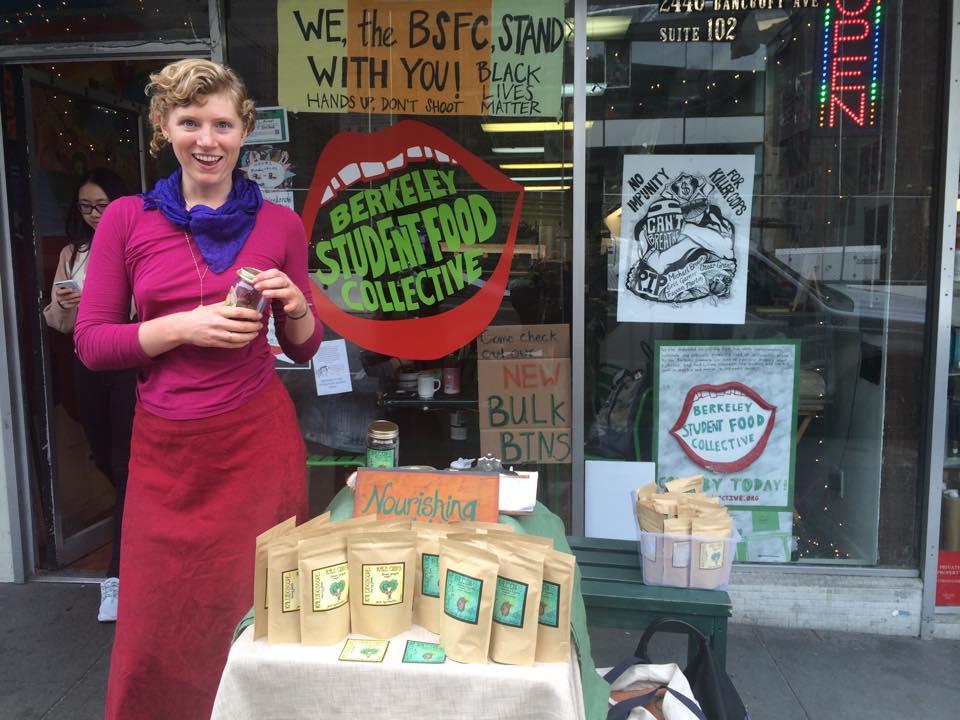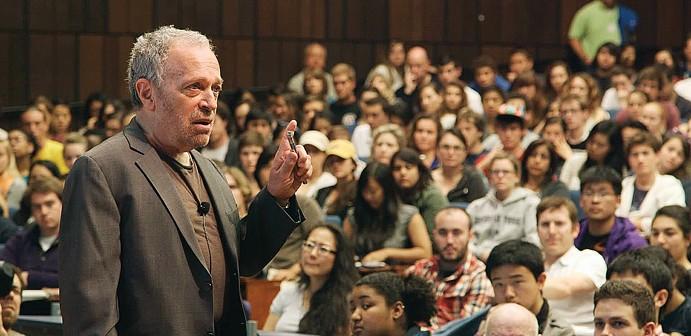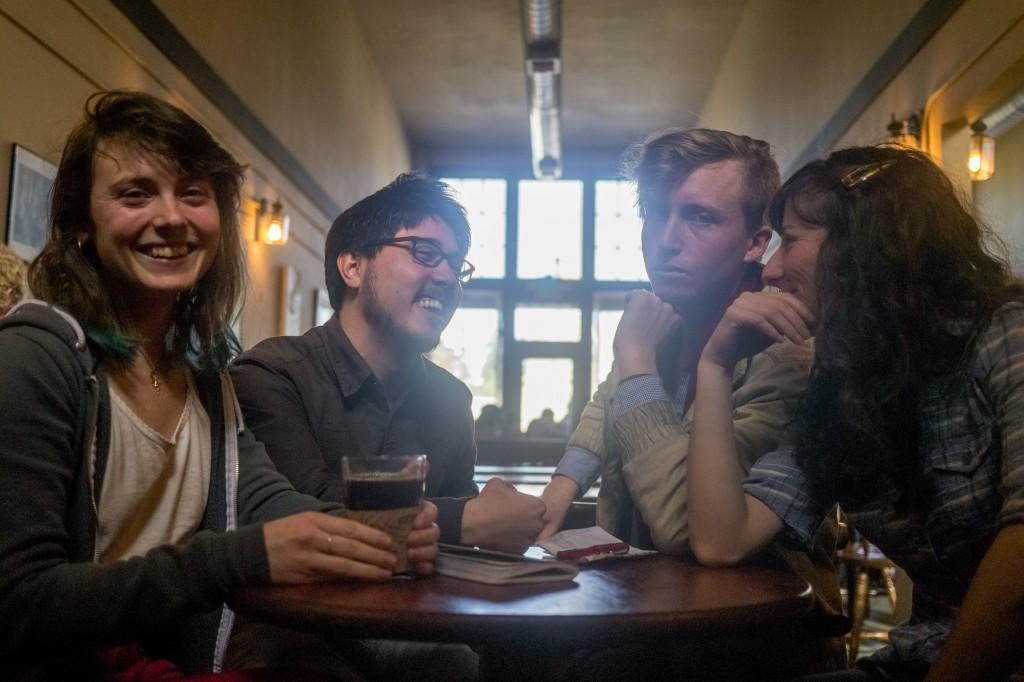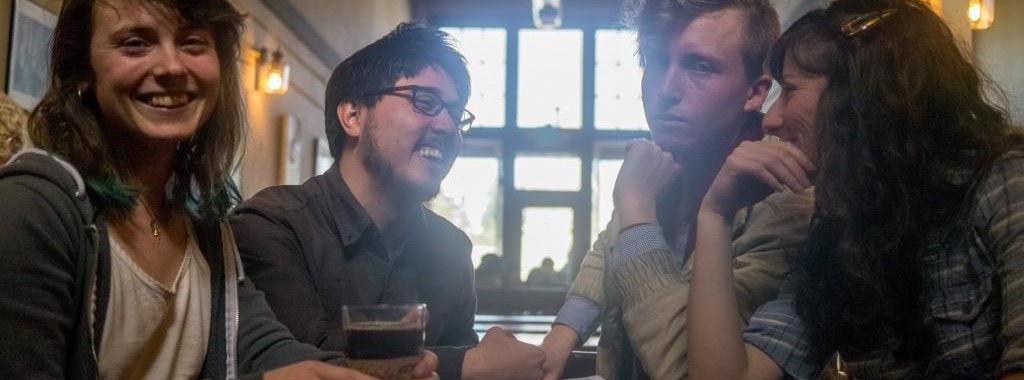By: Hanna Morris, Student Environmental Resource Center, UC Berkeley
It’s mid-morning on Friday and the four Co-op DeCal facilitators are discussing next week’s lesson plans over freshly brewed coffee at Blue Door Café. The syllabus is impressive, with admittedly more resources, field trips and relevant readings than many of my degree’s required courses. Zen Trenholm, an energetic and passionate UC Berkeley alumnus with an incredible amount of knowledge and insight into co-operatives is the lead facilitator for next Tuesday’s class. “Co-operative Histories, Pt. 2: From Henry Lees Kingman to the New Wave Movement,” is the lesson’s title. Clearly, there is a lot more to know about co-operatives than delicious pizza in the Gourmet Ghetto and hipster-filled houses that dot the campus’s periphery.
“There are more fingers on my hand than there are undergraduate classes on co-operatives in the U.S. I think it is absolutely ridiculous that one of the world’s dominant business models isn’t taught at our universities,” Trenholm bemoans. “Our team aims to correct this by making co-operative history and practice relevant and imperative for all students regardless of discipline and previous experience.”
I’ve written about co-ops in the past. I featured the Berkeley Student Food Collective (BSFC) in a spotlight piece for Caliber Magazine a couple years ago. I talked with the outreach coordinator at that time, Matthew Kirschenbaum, and remember leaving the interview feeling genuinely impressed with the professionalism and pragmatic vision of the BSFC. Aside from the tattoos and flannels adorned by most of the student workers, there was nothing hippie-dippie about the enterprise at all. The co-operative model is simply the most profitable way to run the store. The democratic, anti-hierarchical operation of the collective isn’t an added bonus—it is what allows for greater worker and customer satisfaction, higher quality products, and an unabridged celebration of value, in every sense of the word.
 Student promotes new product at Berkeley Student Food Collective. Photo courtesy of the Berkeley Student Food Collective.
Student promotes new product at Berkeley Student Food Collective. Photo courtesy of the Berkeley Student Food Collective.
“Co-ops are simply an organizational model but they can represent a fundamental culture shift in how we assume our economies and community politics should be managed,” Trenholm explains. “If the expectation is that we should live in a free, fair, and democratic society, then our economy must reflect this.”
Hierarchical organization is the overwhelming status quo for most major businesses in the United States today. A domineering CEO and board of directors dependent on shareholder investment is the naturalized norm. Many Americans do not question this structure despite its social and environmental consequences. Namely, plummeting workers’ salaries, benefits, health and overall wellbeing. The “business world” is generally accepted as one that’s rough and dirty. A “dog-eat-dog” culture, the dominant narrative runs, is necessary for raking in the Benjamins and fostering “economic growth.”
But according to the Co-op DeCal facilitators, this is an entirely misconstrued, limited and quite frankly, dangerous understanding of how businesses can and should operate. The hardball corporate model is not the only or best way to run a business. In fact, the shareholder structure has time and time again proven to be more of a bust than boon to economic stability. Remember the 2008 recession, anyone? How about the Great Depression? What about the 1990’s .com slump? Rewarding risk over resiliency clearly has its drawbacks.
“Most of us were raised to be competitive with one another, but co-ops give us a chance to take something that is normally competitive—business, obtaining housing, what have you—and asks that we work together to meet the group’s goals and the community’s needs,” DeCal co-facilitator and BSFC operations manager, Megan Svoboda says.
Both economy and community, according to “co-operators,” should not be mutually exclusive. They should be—and ultimately are—one and the same. Shareholder corporations are structured in a way that overlooks this entanglement. Disempowered communities and workers prevent corporations from making decisions that benefit more than just a few Wall Street investors.
“The truth is, it’s hard to work with groups of people. It’s hard to communicate clearly and to stick it out through the challenges and it’s normally here where co-ops run into trouble,” Svoboda admits. “But in the end, co-ops are more successful than their competitors because they’re grounded in the communities they serve. This allows them to survive economic downturns at a higher rate than ‘normal’ businesses.”
Co-ops can guarantee both short and long-term vitality precisely because they do not need to worry about immediate returns on investment for shareholders in New York. “Co-ops are dynamic and resilient because they often rely on community and member buy-in to guide their activities and people feel a stronger sense of ownership over the business,” Trenholm says. “They will work hard to ensure it remains afloat during the bad times and thrives during the good times.”
But if this co-op model is so wonderful, why aren’t there more of them around?
“I should mention that there are over 30,000 co-ops in the United States alone, generating over $625 billion in revenue, and employing close to 1 million people. Though not well recognized, they certainly are represented in our economy,” Trenholm clarifies.
It turns out, co-ops are not so much a rarity as they are overlooked.
“Over 1 billion people are already involved with co-ops worldwide. There are hundreds of thousands of co-ops all over the world that generate over $2 trillion in revenue. Co-ops have been adopted and accepted since the early 19th century, the only issue has been the lack of recognition for such extraordinary models within the academia as well as mainstream society,” DeCal co-facilitator and Student Environmental Resource Center development director, Roberta Giordano says. “Our DeCal aims to change that.”
The Co-op DeCal facilitators are determined to showcase the merits and historical legacy of co-operatives. They want to clearly articulate that this isn’t a radical or offbeat business formula concocted on the liberal avenues of the East Bay; it is a centuries-old alternative to the hierarchical shareholder model and it has proven effective and profitable time and time again.
 The renowned Robert Reich teaches the consequences of shareholder-driven capitalism in his popular undergraduate course, “Wealth and Poverty.” Photo courtesy of Google Images.
The renowned Robert Reich teaches the consequences of shareholder-driven capitalism in his popular undergraduate course, “Wealth and Poverty.” Photo courtesy of Google Images.
“So much of economic history is defined by the search for this elusive ‘third way,’ this compromise between the freedoms that free-market capitalism provides and the equity promised by more socialist regimes,” DeCal co-facilitator and Student Environmental Resource Center education associate, Jeff Noven, states. “Historically, co-operatives have offered significant freedom and equity in both capitalist and socialist states by keeping democratic principles central in their operations.”
And yet, there is a notable dearth in conversation about co-operative businesses in American culture and curriculum. Many students leave the halls of Haas Business School, for example, without exposure to the benefits or prospects of co-ops beyond an organic food store on Bancroft Avenue and a consortium of student houses with great parties and cooking.
Trenholm hopes that the Co-op DeCal will change this. The facilitators are actively encouraging departments at Berkeley to include histories and practices of co-ops in their core curriculums, especially within the business school. “Our ultimate goal is to launch an academically-sponsored course at Cal on the history and significance of co-operatives and how they can be tools for building sustainable, resilient, and socially-just communities.”
Major universities such as the University of Wisconsin at Madison have already begun to implement co-op studies across their departments. Cal’s students, the DeCal facilitators believe, will greatly benefit from a more comprehensive survey of alternative business models.
While the Co-op DeCal facilitators finish their coffee and lesson plans at Blue Door Café, I sit in Wheeler Auditorium where “Fortunate Son” is blasting from the overhead speakers, Robert Reich is looking as jovial as ever, and my claustrophobia is kicking in as 800 or so caffeinated college students file inside for our Friday afternoon “Wealth and Poverty” lecture. I just turned in my first essay. I had to explain why economic “inequality” is (or isn’t) a concern. Stagnating wages, dwindling workers’ benefits, plummeting mental and physical health, cascading social alienation and political mistrust are all worrisome consequences. The problem is clear, if not daunting. An economy that operates without democratic decision-making and a commitment to long-term vitality spells disaster. But perhaps a workable solution isn’t so forgone.
“A popular figure to quote is one from the Mondragon Co-operative, where the CEO of this tremendously successful co-operative empire makes 9 times the salary of the lowest-paid employee of the company; this is in contrast to traditional corporations that traditionally have CEOs making 600 times the lowest employee salary,” Noven says. “To me, this is the beauty of co-operatives — they don’t actually need an ‘ideal’ society to function ideally: co-operatives have the potential to create ideal societies within the dysfunctional socio-economic systems we’ve set up on both sides of the spectrum.”
Maybe the silver lining to America’s struggle with “wealth and poverty” lies in an overlooked, age-old business model that four trailblazing Berkeley students and alumni are vying to bring to the forefront of business lexicon and discussion. A lot can be achieved, after all, with a visionary DeCal, determination and a cup of Joe from the Blue Door Café.
 The Co-op DeCal facilitators discuss lesson plans at Blue Door Cafe. From left: Megan Svoboda, Zen Trenholm, Jeff Noven, Roberta Giordano. Photo by Jonathan Reader.
The Co-op DeCal facilitators discuss lesson plans at Blue Door Cafe. From left: Megan Svoboda, Zen Trenholm, Jeff Noven, Roberta Giordano. Photo by Jonathan Reader.
The Co-op DeCal meets Tuesdays at 4PM in 258 Dwinelle Hall

